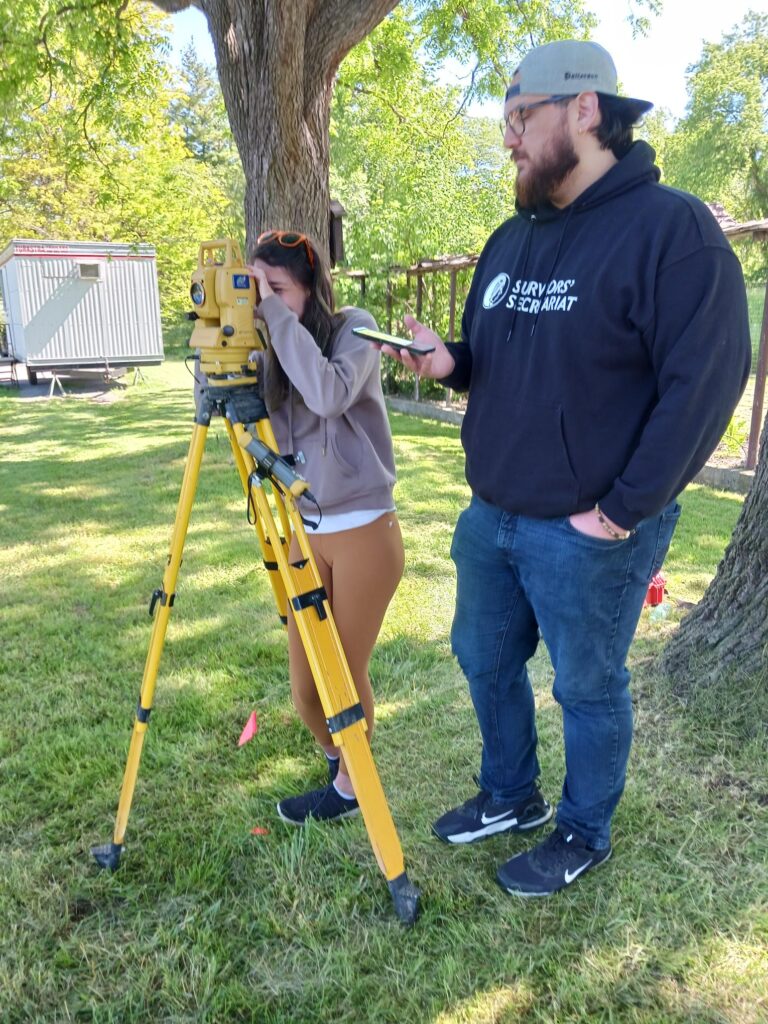For its third year, Survivors’ Secretariat welcomed back a group of Intergenerational Survivors, aged 18-29, through the Reclaiming Our Role – Youth Supporting Survivors Program. Ten students are leading ground search activities at the Mohawk Institute, using Ground Penetrating Radar (GPR) and drone technology.
This 17-week summer program is an ongoing initiative to ensure the work of the Secretariat builds knowledge and skill capacity within impacted communities while providing an opportunity for young people to be part of the healing work. The Secretariat hired students from Six Nations of the Grand River and other Impacted Communities, including the Mississaugas of the Credit First Nation.
“It gives me hope for the coming generations because it takes a lot of strength to do this with commitment. This work takes mental, physical, and spiritual strength.” – Diane Hill, Survivors’ Secretariat Board Member
The program provides young people with a meaningful community-based employment experience. The ground search work provides hands-on skill development and knowledge sharing which allows young people to step into their role as knowledge carriers.
“It was important to the Board of Directors that it was Indigenous people and specifically First Nations youth doing the work because of the history and the need for the younger generations to be part of the healing journey.” says Dawn Hill, Survivors’ Secretariat Board Member

The Search for Missing Children and Unmarked Burials Continues
Survivors’ Secretariat began its ground search work into unmarked burials in November 2021. The Secretariat’s efforts are tied to 600 acres of land associated with the former Mohawk Institute, located in Brantford, ON. To date, GPR data has been collected on over 15 acres (approximately 20) of the grounds with most of the data being collected by our Youth team.
The group is trained to lay search grids with three GPR machines, to collect ground scans of the area. The Ground Search team is guided by a panel of archeologists who advise the data collection process.
“The Youth are part of the important work to find answers, they are working closely with Survivors to learn the truth about what happened. They are trained in ground search techniques under the instruction of archeologists and geophysicists from Lakehead University, Western University and the University of Alberta.” – Laura Arndt, Secretariat Lead
Healing, Friendships and a Path forward
The Youth team at the Survivors’ Secretariat are passionate about bridging the generational gap between Survivors and Youth. By learning the truth, this generation of young people see and acknowledge the impact of intergenerational trauma reflected in their families and communities.
“Sharing and passing down knowledge of our community’s history helps strengthen the bond between our Survivors’ and youth. It creates a sense of unity, purpose and connection, where both generations can begin the slow process of sharing and understanding the true history of what happened here. The simple action of working together is where the seeds of healing take root.” – Laura Arndt, Secretariat Lead
Through advocacy, the YSSP team aims to raise awareness, foster resilience, and sow the seeds of meaningful change, ensuring the truth of Indian Residential Schools is acknowledged and preserved for future generations.
Indigenous and non-Indigenous youth alike are crucial in amplifying Survivor voices, advocating for justice, and encouraging positive change. The students believe in honouring the truth, while fostering better relations between Indigenous and non-Indigenous peoples. The team emphasizes the importance of Ka’nikonhri:yo, keeping a good mind, and striving to understand each other’s perspectives.
Staying Grounded
As the youth team conducts the ground search, the work involved in this program can be very emotional at times, bringing up feelings of grief or shame. To ensure their physical and spiritual health remains a priority, the Secretariat offers cultural and western based wellness support throughout the search season.
Every morning starts out with a brief check-in. The youth share their thoughts and feelings on the work being completed, and how they feel about being in the field that day. Our team lead ensures traditional medicines are available, and each check in ends with a smudge.
On the days when the heaviness of the work is felt, the students pause and take a step back to focus on wellness. The youth team believes that a relaxed and supportive work environment is part of their healing journey; some laughing and bonding with each other as they create safe spaces and feelings of support for one another.
“The Survivors’ Secretariat thanks you for your ongoing participation in the work of Bringing the Children Home.” - Survivors’ Secretariat Board of Directors and Staff
Stay Tuned
Stay tuned to the Survivors’ Secretariat social media accounts to meet the 2024 Youth Supporting Survivors’ Summer Team, and to discover more about the ongoing efforts in this year’s journey.